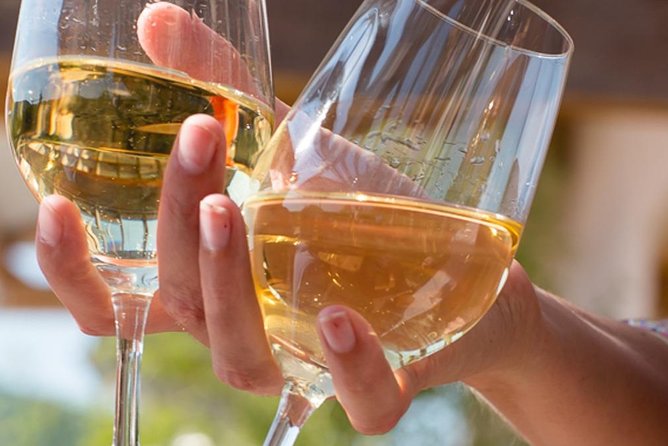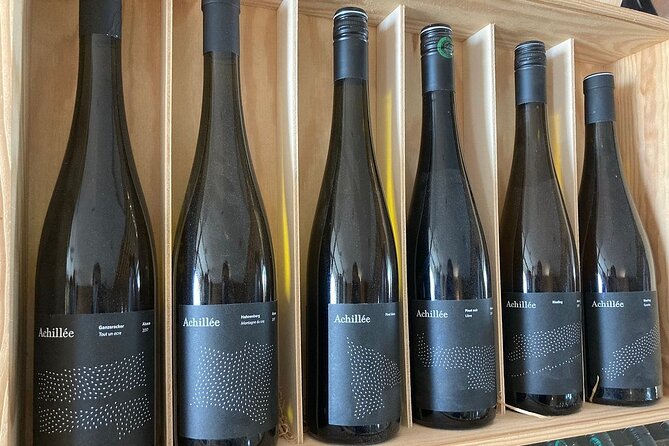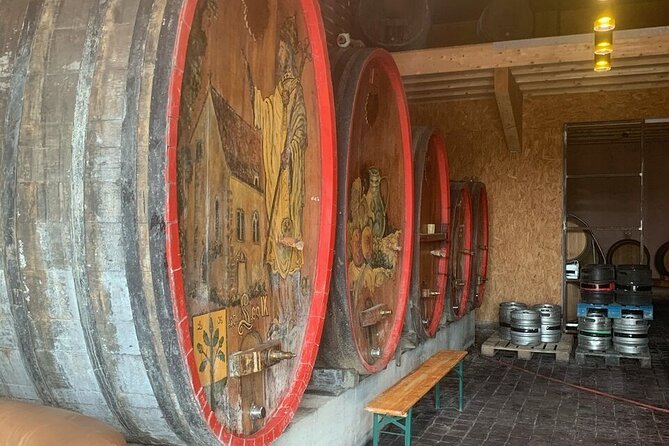Discovery and Tasting of Biodynamic Wine in Alsace
Nestled in the serene vineyards of Alsace, the journey of Discovery and Tasting of Biodynamic Wine beckons curious connoisseurs to uncover the secrets of this sustainable winemaking practice.
With a focus on harmony with nature, visitors are introduced to the meticulous process behind crafting these unique wines. From the initial grape cultivation to the final pour, each step reveals a story of tradition and innovation.
As the cork pops and the first sip tantalizes the taste buds, a world of flavors awaits those eager to explore the magic that biodynamic winemaking in Alsace has to offer.
Key Points

- Alsace offers a captivating vineyard tour blending French and Germanic traditions.
- Biodynamic winemaking in Alsace showcases holistic agriculture and lunar cycle integration.
- Tasting reveals rich flavors, intense aromas, and a balanced, lasting finish.
- Sustainability practices in winemaking support eco-friendly methods and local communities.
Biodynamic Wine: What Makes It Unique

Biodynamic wine stands out in the world of winemaking for its holistic approach to agriculture, focusing on the interconnectedness of the vineyard ecosystem and celestial influences. This unique farming method incorporates practices that consider the lunar cycles, aligning planting, pruning, and harvesting with the phases of the moon.
Biodynamic farming goes beyond organic practices by treating the vineyard as a self-sustaining organism, utilizing natural fertilizers and pest control methods. The lunar cycles play a crucial role in biodynamic viticulture, guiding winemakers in their decision-making processes and enhancing the overall quality and expression of the wine.
Alsace Region: A Brief Overview

In the picturesque Alsace region, known for its charming villages and stunning vineyard landscapes, a rich tapestry of history and culture awaits wine enthusiasts.
Alsace history dates back centuries, influenced by both French and Germanic traditions, resulting in a unique blend of architecture and cuisine.
The region’s wine tourism is vibrant, offering visitors a chance to explore over 100 wine villages, each with its own distinct character and terroir.
Wine lovers can indulge in tastings of renowned varietals like Riesling and Gewürztraminer, while seeing the beauty of vine-covered slopes.
With its captivating history and thriving wine culture, Alsace beckons travelers to discover its treasures.
Vineyard Tour: Exploring the Terroir
Set out on a sensory journey through the lush vineyards of Alsace to uncover the essence of terroir. When exploring these vineyards, visitors can witness firsthand the meticulous techniques employed by biodynamic winemakers.
The soil composition in Alsace plays a crucial role in shaping the flavors of the wines produced here. The unique blend of clay, limestone, and marl contributes to the distinct characteristics found in the region’s wines.
Tasting Experience: Flavors and Aromas
Exploring the lush vineyards of Alsace reveals a sensory delight as visitors enjoy the intricate tapestry of flavors and aromas awaiting discovery during the wine tasting experience. As they sip the biodynamic wines, a sensory exploration unfolds, enhancing their wine appreciation through:
-
Rich Flavor Profiles: Each sip unveils layers of complexity, from crisp citrus notes to luscious berry undertones.
-
Intense Aroma Analysis: The wines exude captivating scents of blooming flowers, earthy minerals, and hints of oak.
-
Balanced Fruitiness: Discover a harmonious blend of fruity sweetness and subtle acidity dancing on the palate.
-
Long Lasting Finish: The wines leave a lingering impression, with velvety textures and elegant finishes that linger delicately.
Winemaking Process: From Grapes to Bottle
Upon entering the winery, visitors witness a meticulous process unfolding as grapes transform into the exquisite bottles of wine that grace tables worldwide.
The winemaking journey typically begins with grape harvesting, where experienced hands carefully pick the ripe fruits, ensuring only the best quality grapes are selected. Once harvested, the grapes undergo the fermentation process, a crucial step where sugars in the grapes are converted into alcohol by yeast.
This transformation is closely monitored by winemakers to achieve the desired flavor profile and characteristics of the wine. The fermentation process can vary in length depending on the type of wine being produced, with some wines requiring longer fermentation periods for optimal development.
Each stage in the winemaking process contributes to the unique qualities found in every bottle of biodynamic wine.
Sustainability Practices in Winemaking
Sustainability practices play a pivotal role in modern winemaking, ensuring environmental responsibility and long-term viability in the industry. Winemakers are increasingly embracing organic farming and eco-friendly practices to minimize their impact on the environment and produce high-quality wines. Here are some key sustainable practices adopted by winemakers:
- Utilizing organic farming methods to reduce chemical use and promote biodiversity.
- Implementing eco-friendly practices such as water conservation and energy efficiency in vineyard management.
- Embracing sustainable packaging solutions to reduce waste and carbon footprint.
- Supporting local communities and wildlife conservation efforts through responsible land stewardship.
These sustainable initiatives not only benefit the environment but also contribute to the production of authentic and ethically produced wines.
Food Pairing: Enhancing the Wine Experience
Enhance your wine tasting experience by exploring the art of food pairing, which can elevate the flavors of both the wine and the dish. Food pairing is a fascinating way to enhance the sensory exploration of wine.
When done thoughtfully, pairing the right food with a biodynamic wine can create a harmonious balance that enhances the overall tasting experience. Consider the wine’s acidity, sweetness, and body when selecting a dish for pairing.
For example, a light and crisp biodynamic white wine may complement seafood dishes beautifully, while a robust red could enhance the flavors of a rich beef stew. Experimenting with different food pairings can open up new dimensions of taste and help you appreciate the intricate nuances of biodynamic wines even more.
Common questions
Can Children Participate in the Biodynamic Wine Tasting Experience in Alsace?
Children can engage in the educational wine tasting experience in Alsace. It offers a unique opportunity for child participation, enhancing their understanding of biodynamic practices. The experience fosters a learning environment while appreciating the flavors of the region.
Are There Any Specific Health Benefits Associated With Consuming Biodynamic Wine?
Consuming biodynamic wine may offer potential health benefits due to its organic farming methods. This wine is believed to retain higher nutritional value and antioxidants, promoting overall well-being. Enjoying biodynamic wine may provide a unique blend of taste and potential health perks.
How Long Has Biodynamic Winemaking Been Practiced in the Alsace Region?
Biodynamic winemaking in the Alsace region dates back to the early 20th century. Its history intertwines with organic farming principles and mystical beliefs. The techniques focus on holistic vineyard management, lunar cycles, and natural preparations, creating a unique approach to winemaking.
What Sets Biodynamic Wine Apart From Organic or Conventional Wine?
Biodynamic farming, unlike organic methods, aligns with the lunar calendar for planting and harvesting. It emphasizes sustainable agriculture, enhancing terroir expression. This approach fosters a holistic ecosystem, creating wines that reflect their unique environment and vineyard practices.
Are There Any Cultural or Historical Aspects Related to Biodynamic Winemaking in Alsace That Visitors Should Be Aware Of?
Visitors exploring biodynamic winemaking in Alsace should be aware of its deep cultural traditions and historical significance. These practices are intertwined with the region’s heritage, reflecting a harmonious relationship between nature and wine production.
Last Words
Enjoy the enchanting world of biodynamic winemaking in Alsace, where tradition and innovation harmoniously blend to create exceptional wines.
From the lush vineyards to the expertly crafted bottles, this sensory journey offers a unique perspective on sustainable viticulture practices.
Discover the magic of biodynamic wines through a tasting experience that showcases the distinct flavors and aromas of the region.
Explore the beauty of Alsace through its wines and experience a truly unforgettable journey.